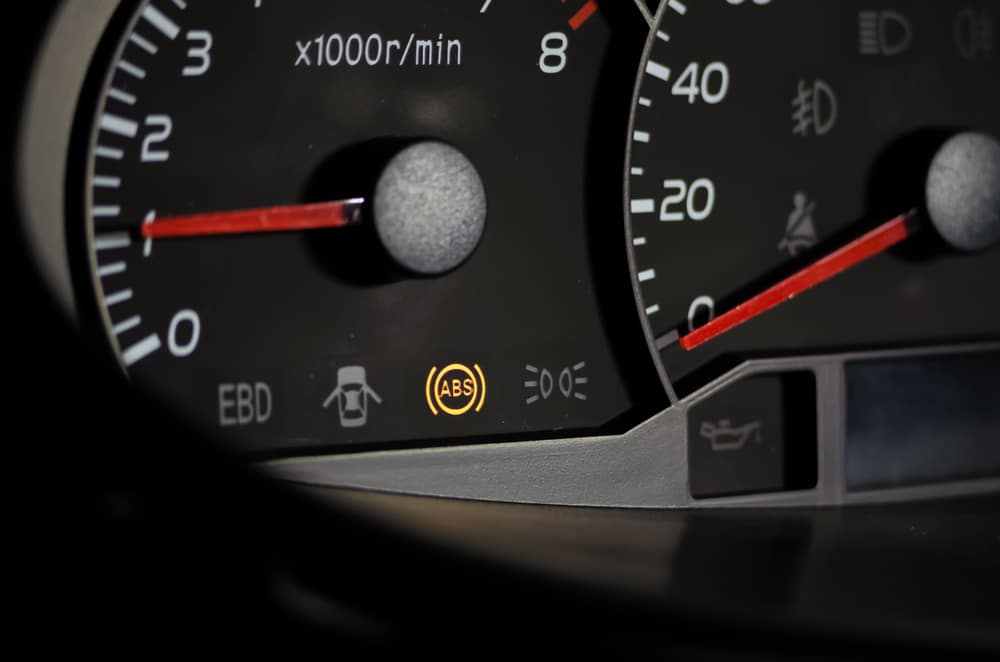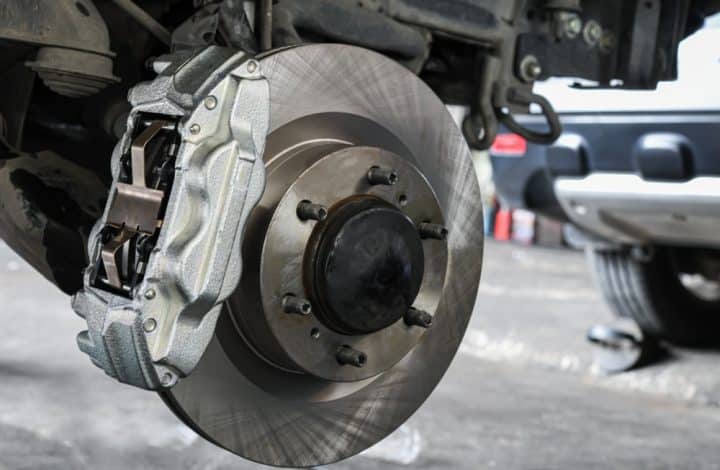Anti-Lock Brakes
You’re driving up the M1 when suddenly, traffic slows ahead. You hit the brakes hard. But instead of a steady stop, the wheels lock, the tyres skid, and your car begins to skreech off course. As you try to correct the steering, the dashboard ABS warning light that you didn’t get resolved flashes in your mind. It’d been on for a while. Now it’s too late to ignore.

The anti-lock brakes system, or ABS, is designed to keep your tyres gripping the road and your steering responsive when braking becomes urgent. It’s not about stopping sooner. It’s about staying in command of your vehicle under pressure.
At Roade Main Garage in Northampton, we help drivers get ahead of Anti-Lock Brakes System faults before they turn into safety risks. When a warning light appears or something feels off in your braking, we carry out a full diagnostic evaluation to find the fault fast.
In this guide, we’ll break down how ABS works, what signs point to trouble, and when to get it checked.
Let’s begin.
What the Anti-Lock Brake System Does
Anti-lock brakes exist to stop your wheels from locking up when you brake hard, especially during sudden stops or on slippery roads. Its main function isn’t necessarily to shorten stopping distance, but to help you stay in control while slowing down.
If ABS isn’t working, pressing the brake pedal forcefully can cause the wheels to seize. That’s when grip is lost, and with it, your ability to steer. This puts you at risk of skidding into other vehicles, pedestrians or barriers. ABS prevents this by rapidly adjusting brake pressure at each wheel to keep them moving just enough to maintain traction.
In short, ABS gives you the best chance of controlling a sharp stop and keeping the ability to steer your car in an emergency situation. It can be what makes all the difference in a split second.
How ABS Responds When You Brake Hard
ABS is active constantly in the background while your motor is running. As you drive, it monitors each wheel in real time, tracking how fast they’re rotating. When one wheel begins to slow too sharply during braking, the system steps in immediately.
Each wheel has a speed sensor feeding data to the ABS control unit. That data is analysed constantly. If a wheel is about to lock, the system responds by adjusting brake pressure through the ABS modulator. It reduces pressure just enough to keep the wheel turning, then reapplies it once grip returns. This process happens rapidly, many times per second.
You might feel it as a pulsing in the pedal during hard braking. That’s not a fault. It’s the system doing its job, keeping the tyres in contact with the road.
If something disrupts that process, such as a faulty sensor, sticky valve, or damaged wiring, the ABS won’t activate as it should. That’s when the ABS warning light appears. If it stays on, call Roade Main Garage in Northampton on 01604 862262. We’ll carry out a full diagnostic inspection to find the cause and restore safe braking.
Where Anti-Lock Brakes System Components Are Located and What They Each Do
Your ABS system is made up of several specialised parts, each doing a specific job and positioned in different areas of your vehicle. Together, they detect wheel behaviour, manage brake pressure, and help you maintain grip when braking gets intense.
- Wheel speed sensors – Positioned near the brake discs at each wheel. These track how quickly each wheel is turning and send that data to the ABS control unit.
- ABS control unit (ECU) – Usually mounted in the engine bay. It receives signals from the wheel sensors and calculates whether any wheel is about to lock up.
- ABS modulator or hydraulic pump – Also found in the engine compartment. This uses valves and a high-speed pump to reduce, hold, or reapply brake pressure within moments.
- Brake lines and solenoid valves – These manage brake fluid flow to each wheel. The valves adjust the pressure on command to help prevent wheel locking.

At Roade Main Garage in Northampton, our technicians are trained to inspect, test, and repair every part of your ABS system. If your warning light has come on or the brakes don’t feel right, give us a call on 01604 862262. We’ll carry out a full diagnostic evaluation and make sure every component is working as it should.
Keen to learn more? You can also check out our blogs on Brake Pads, Brake Discs, and Braking Systems to learn how each part plays its role in stopping safely.
The Other Safety Features That Count on ABS to Function
ABS is just one of your car’s stability systems. It also supports other advanced safety systems which rely on the same sensor feedback and pressure control that ABS uses. Without it, they can’t respond as they should.
Here’s how each one works:
- Electronic Brakeforce Distribution (EBD) – This balances brake pressure between the front and rear wheels. It’s especially important when carrying extra passengers or luggage, helping prevent the back end from becoming unstable.
- Traction Control System (TCS) – On wet or loose roads, if a wheel spins under acceleration, TCS applies braking to that wheel and reduces engine power until it regains grip.
- Electronic Stability Programme (ESP) – If the car begins to veer or the rear wheels start to slide out of line, ESP steps in. It applies brake force to individual wheels to bring the vehicle back in line with your steering.
All of these systems are linked to ABS and rely on ABS data to function correctly. If your ABS develops a fault, any of these systems may stop working or respond too slowly to help.
If any warning lights are showing or the car feels unstable during braking or cornering, call Roade Main Garage on 01604 862262. We’ll carry out a full diagnostic assessment and restore system-wide safety.
What Can Stop ABS from Kicking In When You Need It
ABS is engineered to respond instantly, but certain conditions or faults can prevent it from activating properly when you slam the brakes.
One of the biggest factors is the road surface. On ice, gravel or packed snow, there may not be enough grip for ABS to maintain control. While it still helps with steering, the system can’t overcome the physical limits of tyre traction. That’s why careful driving is still essential, even with ABS on board.
Another issue comes from faults inside the system. A damaged sensor, a failing modulator, or low signal from a valve can all prevent the system from working as intended. In many cases, you’ll see the ABS warning light come on to flag the issue.
At Roade Main Garage in Northampton, we don’t leave braking safety to chance. If your ABS light is on or your car feels unstable under pressure, we’ll carry out a full diagnostic procedure to find the fault and get your system back to full performance.
How to Tell If There’s An Issue With Your Anti-Lock Brakes System
You won’t always notice a problem with ABS in everyday driving. But when you need to stop sharply, its absence can put you at real risk. Recognising the early warning signs is key to staying safe.
Look out for these:
The ABS warning light stays onIt’s normal for the light to appear briefly when the engine starts. But if it stays on while driving, the system has disabled itself due to a fault. Regular braking will still work, but the anti-lock function won’t. Call Roade Main Garage in Northampton on 01604 862262 to book in for a full check.
No vibration during heavy brakingABS usually creates a pulsing sensation in the brake pedal during hard stops. If you don’t feel that and the wheels lock, the system may not be working.
Brake and ABS lights appear togetherSometimes, a problem in the ABS system can also trigger the main brake warning light. If both appear, you may have multiple issues affecting braking safety.
If any of these signs are showing, we recommend a complete diagnostic evaluation as soon as possible. It’s the best way to ensure your brakes and your safety are fully protected.
Why You Should Never Ignore Brake or ABS Warning Lights
It’s tempting to ignore a dashboard light if the car still feels fine. But when that light relates to ABS or the brake system, it’s a sign that a crucial safety feature may no longer be active.
When ABS switches off due to a fault, you’re left without the system’s pressure control and grip management. That means the wheels can lock during an emergency stop, making steering almost impossible. You might not notice the difference at low speed, but on faster roads or in poor weather, it could prevent you from avoiding a collision.
There’s also the MOT to think about. If the ABS warning light is illuminated, your vehicle will fail. If the brake warning light is also on, that’s another serious defect.
At Roade Main Garage in Northampton, we treat these signs with the urgency they deserve. If either warning light has appeared on your dashboard, call 01604 862262. We’ll carry out a full braking and ABS evaluation and help keep you safe on the road.
Book with Roade Main Garage and Stay in Control
ABS is one of the most important safety systems in your car. It’s designed to protect you in the split-second moments that matter, but only if it’s working properly. If your warning light is on or braking feels off, don’t leave it to chance.
At Roade Main Garage in Northampton, we carry out full diagnostic evaluations to identify ABS faults and restore safe, stable braking. Our experienced team will check every component, from sensors to modulators, and explain exactly what’s needed to put things right.
Here’s what you can expect from us:
- Clear diagnosis and expert repairs
- 12-month parts and labour guarantee
- Courtesy car options available
- A {{average-rating}} star Google rating from {{review-count}} satisfied customers
Call 01604 862262 to book your ABS system check today and drive with confidence, rain or shine.



